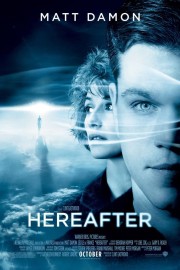Hereafter
Clint Eastwood’s “Hereafter” starts with a startling and powerful set piece- a tsunami that levels a honeymoon resort- and continues with seemingly unconnected stories of grief and loss. Admittedly, it’s tricky to figure out where Eastwood is headed, especially when you consider the trailers and ads have focused all on Matt Damon’s psychic contact to the other side. But once you figure out the central concept of Peter Morgan’s script, which is less focused on telling a linear story and more interested in a greater exploration of the ways people cope with death, this film will grab you.
As I mentioned, the film starts with a tsunami in a Latin American honeymoon getaway where French journalist Marie LeLay (Celice de France) and her husband are getting ready to leave. She goes out to shop for souvenirs for their children, and very nearly dies, haunted by the image of a little girl and her teddy bear.
In London, twins Marcus and Jason (George & Frankie McLaren) are getting a present for their alcoholic, negligent mother- a portrait of them. One day, Jason is going out to get a prescription for their mother, when a group of bullies gangs up on him. He’s chased into the street, where a car hits him, killing him.
In San Francisco, George Lonegan (Matt Damon) is trying to disappear into a normal life. Formerly a noted psychic, George just wants to be left alone, but his brother Billy (Jay Mohr) and a woman he meets in a culinary class (Melanie, played by Bryce Dallas Howard), force him to consider that maybe his former life has value to others in need.
This is unlike any film Eastwood has ever made. It’s not about moral puzzles in the same way “Unforgiven,” “Mystic River,” “Gran Torino,” or “Million Dollar Baby” were. But something it does share with his greatest films is a respect for the spiritual well-being of his characters. These characters deal with death, near-death and the afterlife in very different (and compelling) ways, and it’s a credit to the combined storytelling maturity of Eastwood (who also composed the film’s poignant score) and Morgan (who, honestly, should be in line for his third Oscar nomination in five years for his original screenplay) that each story follows a very natural path to an otherwise unnatural (read: Hollywood) finale that ties the story together. This feels like the type of movie Peter Jackson tried to do with his adaptation of Alice Seibold’s “The Lovely Bones,” but couldn’t quite pull off (although I still contend he did better than anyone else could have with that heartbreaking and complex story). Eastwood works his typical magic with his actors, from Damon to de France to the young McLaren twins to even Jay Mohr, in a film that hits at unexpected and unforgettable truths about the nature of what lies on the other side.










